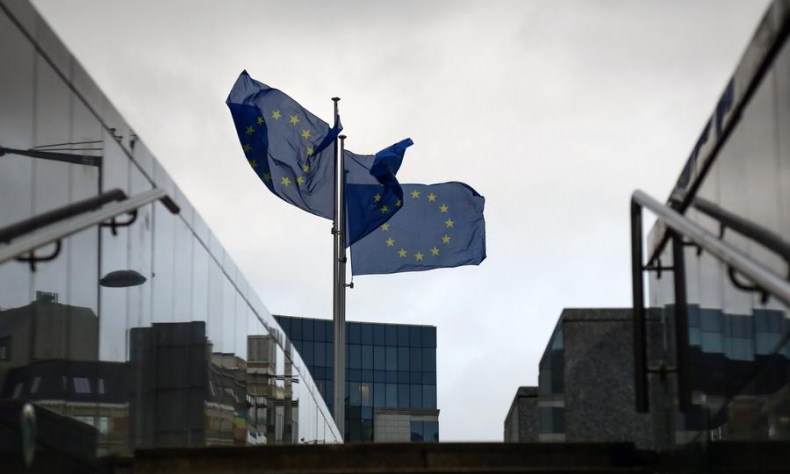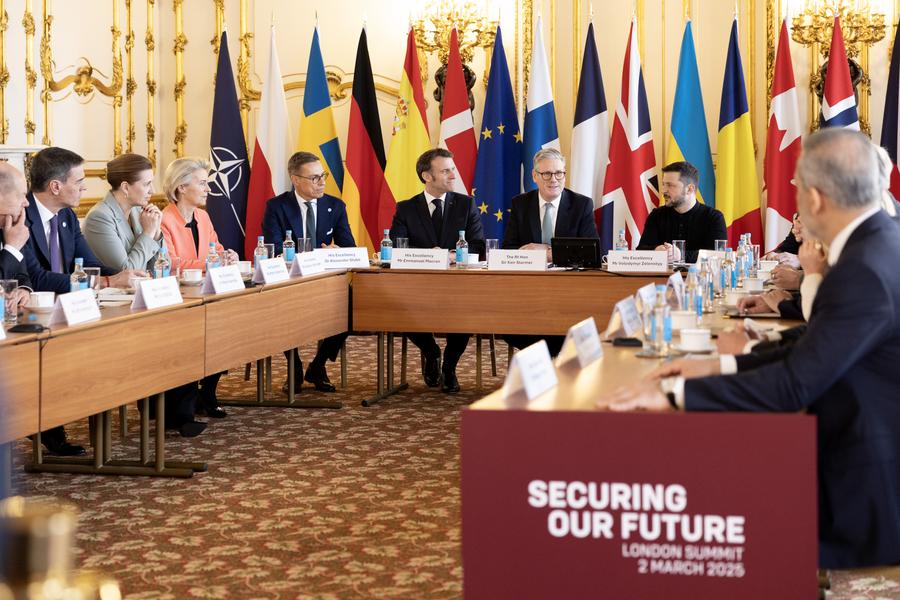Eyes for Future

The similarities in goals and strategies can provide China and Europe with momentum for enhanced cooperation, ensuring that both sides could continue to benefit from each other’s development and would offer models of effective cooperation and viable solutions for other countries in a world of uncertainty and turbulence.
Europe is currently experiencing a period of turmoil unseen since the end of the Cold War. The drastic changes in geopolitics, particularly the betrayal of a traditional ally and the consequent damages, are placing Europe in a position where its future is uncertain.
The second Trump administration heralds a phase of comprehensive, long-term, and profound change in the Europe-U.S. relationship since the end of World War II. The transatlantic partnership can no longer return to the way it was.
After gradually recognizing the trend of the world order evolving in a multipolar trajectory, Europe should re-evaluate its international environment, carefully reassess its former allies, and redefine its partnerships under the principle of opposing unilateralism and upholding multilateralism. China, which has consistently maintained a coherent and consistent policy toward Europe and an active advocate for multilateralism, can serve as a reliable partner for Europe in exploring new pathways for development.
The U.S. is challenging the rules-based order upheld by Europe. Safeguarding the rules-based world order had been a consensus between the U.S. and Europe amid their efforts to consolidate their alliance and counter the so-called challenges posed by non-Western countries. They often used this rationale to exert diplomatic and security pressures on their “challengers.”
During the first term of Trump’s presidency, the Europe-U.S. consensus on rules faced significant challenges. Therefore, during the Biden administration, Europe emphasized the rules-based approach to international affairs, attempting to diminish Trump’s political influence and stabilize the Europe-U.S. alliance.
However, after Trump resumed power under the slogan of Make America Great Again, the U.S. policies in the areas of politics, economy, and security are gradually undermining the so-called rules-based order. Europe, which once attempted to uphold this order in coordination with the U.S., has been adversely impacted to the greatest extent.
Economically, Europe has not been spared from the unilateral tariffs imposed by the Trump administration, despite its status as America’s economically and largest trading partner.
In terms of security, the Trump administration not only abandons the stance shared with Europe on the issue of Ukraine, sidelining Europe, the most important stakeholder in the issue, but also sought to ease relations with Russia, which is regarded by Europe as the greatest security threat. Furthermore, it has openly threatened to use force to seize the territories of European nations and planned to abandon NATO, which is viewed by some European countries as a security guarantee.
Politically, the Trump administration’s open and direct support for far-right political parties has caused significant harm to Europe, undermining their “alliance of shared values” and making such alliance exceedingly fragile in the face of Trump’s America First policy.
What Europe finds most difficult to face and accept is that the various forms of coercion and harm brought by the U.S. are not merely a temporary phenomenon resulting from the Trump administration or the policy adjustments of the Republican Party. The fact that Trump garnered the majority support of the American public for a return to power, coupled with the actions of the Biden administration that undermine the common rules of Europe and the U.S., indicates that as long as the U.S. is determined to maintain its hegemony, the so-called rules-based order is merely a guise for power politics. The ultimate aim is nothing short of political deception targeting Europe and an instrument to maintain the hegemonic order. Therefore, if Europe cannot reflect deeply on these developments and seek genuine strategic autonomy, it may further become a vassal and tool of the U.S. in its pursuit of hegemony.

The U.S. policy direction is damaging the international environment on which Europe relies for survival and development. The comprehensive and dramatic changes emerging in the transatlantic relationship are not only undermining the rules-based order that Europe holds dear, but also severely harming the common values of the international community, eroding the foundational interests shared by China, Europe, and the majority of other countries.
Through imposing unilateral tariffs on the entire world, the Trump administration aims to increase fiscal revenue, create room for domestic tax reduction in the short term, bring back manufacturing and increase foreign investment in the U.S. in the medium and long term. This move will raise economic costs for various countries, extract economic interests from them, and dismantle the multilateral trade system centered around the World Trade Organization. With these, the Trump administration attempts to establish a new order based on bilateral trade negotiations, in which the U.S. holds an absolute advantage.
The objective of the Trump administration’s foreign and security policy is to quickly “resolve” the Russia-Ukraine and Israel-Palestine conflicts by means of blame shifting and scapegoating. In this way, it can accelerate a strategic shift and redirect resources and focus to domestic affairs and long-term strategic directions. This will further render its allies into a subordinate role, hurt the interests of other countries, and heighten the risks of competition and confrontation between major countries.
As the only superpower in today’s world, the U.S., implementing policies centered on its own narrow interests, would inflict irreparable damage to the stability of the international order and the sustainability of common interests of the world. Such policies pose a direct and long-term threat to China and Europe, which both benefit from the relative stability of the international community and the mutually beneficial global division of labor.
Facing shifting dynamics across the Atlantic Ocean, Europe needs to abandon its outdated views on allies and establish with sincere and reliable partners long-term relations that can bring concrete and win-win outcomes. In the face of the Trump administration’s forceful reshaping of transatlantic relations, Europe now stands at a historical crossroads, with two paths ahead. One is to maintain the status quo, clinging to a decaying Western-centric order that in practice follows the leadership of the United States — ultimately making Europe a pawn in the new U.S hegemonic scheme. The other is to forge ahead toward the goal of achieving strategic autonomy and integrated development, so as to become a major constructive force in a new multipolar world.
Europe has already demonstrated strong determination and courage to reduce its dependence on the United States and to build strategic autonomy through a series of moves, such as political actions that oppose American unilateralism, counter-tariff measures, and the “rearmament” plan to strengthen regional security. However, to eradicate the mentality of the traditional Euro-American alliance, Europe must embrace a fair, open, and inclusive world. It is critical for Europe to seek sincere and trustworthy partners who treat each other as equals and endorse a principle-based, responsible, and efficiency-driven multilateralist approach.
This year marks the 50th anniversary of the establishment of diplomatic relations between China and the EU. Fifty years of China-Europe relations have proven that both sides are constructive forces for maintaining peace and promoting development. Mutual respect and practical cooperation between China and Europe can serve as sources of confidence and strength for Europe to tackle various challenges.

Over the past five decades, sustained cooperation has created a strong bond of shared interests between China and Europe and such bond cannot be easily severed by protectionism. This tie forms a solid foundation for both sides to build consensus, coordinate positions, and act together in the midst of current global transformations. In response to the U.S. abuse of tariffs and protectionist measures, China and Europe are defending their common interests through actions, such as voicing opposition, resuming negotiations on electric vehicles, and exploring new areas of cooperation.
Although the U.S. remains an important trading partner for both China and Europe, it is not the only option. As long as China and Europe maintain communication and coordination in economic and trade policies and open sectors, such as manufacturing, new energy, and services, to each other, they can thrive in the global market. This not only allows them to meet challenges from the U.S., which represents only 13 percent of the global market, but also opens up new space for profit growth.
Continuous dialogue over the past five decades has helped establish a strong consensus between China and Europe on multilateralism — one that is resilient against Cold War mentality and bloc confrontation. This consensus provides a source of confidence for the two sides to manage geopolitical tensions, promote regional peace and development, and build strategic mutual trust.
China’s stance on regional conflicts, such as the Russia-Ukraine crisis and the Israel-Palestine conflict, as well as on key European concerns like the refugee issue and climate change, has been fair, just, open, and consistent. This stands in sharp contrast to the U.S.’s self-serving, flip-flopping, and blame-shifting approach. As the U.S. seeks to dictate the process of political settlement for these crises, China welcomes any problem-solving effort but emphasizes the importance of fair, transparent procedures and the legitimacy and sustainability of outcomes. China finds it unfair that Europe is excluded from U.S.-led political talks over the Ukraine crisis, and supports Europe’s involvement and leadership in political resolution on this matter.
Although different historical experiences and current situations may result in divergent views on geopolitics and regional conflicts between China and Europe, this does not prevent them from taking on greater shared responsibilities — based on the UN Charter and principles of international laws — in ending conflicts and restoring peace. With this effort, strategic trust can be established, despite ideological differences, to maintain regional strategic balance and contribute to global strategic stability.
Over the past five decades, experience in deepening cooperation and managing competition has created a remarkably resilient and close China-Europe relationship that will not be undermined by global turmoil. This can serve as a strong driving force for the two sides to seek development through openness, pursue stability through reform, and break new ground in an evolving international landscape.
China continues to deepen reform and opening up and seeks to strike a rational balance between pursuing development and ensuring security. Meanwhile, Europe is trying to establish “open strategic autonomy,” aiming to enhance its external security environment while sustaining economic growth and political stability. The similarities in goals and strategies can provide China and Europe with momentum for enhanced cooperation. This would ensure that both sides could continue to benefit from each other’s development and would offer models of effective cooperation and viable solutions for other countries in a world of uncertainty and turbulence.
Cui Hongjian is professor at the Academy of Regional and Global Governance and director of the Center for EU and Regional Development Studies, Beijing Foreign Studies University.
 Facebook
Facebook
 Twitter
Twitter
 Linkedin
Linkedin
 Google +
Google +










